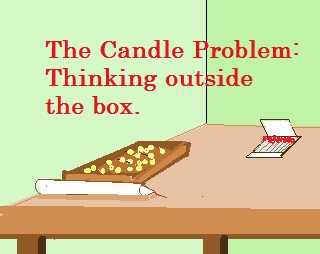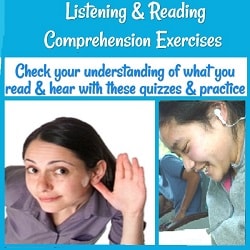Can You “Ace*” this Comprehension Test?
The value of taking a reading or listening comprehension test is that it gives you a way to check how well you understand a difficult article. (Of course, it also gives you practice with test-taking and common test question types—very useful if you need to take an important test soon.)
This TED talk about the uses of extrinsic motivation versus intrinsic rewards has an important message for businesses. Dan Pink presents himself as a lawyer making his case (presenting his arguments) on why businesses need to change their thinking.
He jokes about himself and about American attitudes by expressing or exaggerating stereotypes he doesn’t really believe (that his audience knows he doesn’t believe, such as “Americans don’t believe in philosophy”) to make a serious point.
He talks about a “mismatch between what science knows and what business does.” Business practices should—but do not-- match what researchers have repeatedly proved to be true. His hope is to reverse the assumptions that employers make about how to get the best work from their employees, to make the U.S. and the world more productive.
Do You Want to Practice Listening, Reading, or Both?
After watching this video, take the test below immediately if you are practicing listening comprehension. (Right-click here if you would rather download the Comprehension Test as a pdf.) To practice reading comprehension (or just to understand the English as well as possible, go to the TED page itself and read the transcript (the written record of what he said) in English before taking this test. You can find the "interactive transcript" below the video and title on their page. (You can also see the video full screen there.)
I think this research is important enough to be worth the time it takes to both watch and read it (more than once if that helps)—and it will increase your English vocabulary and fluency as well!
*(Incidentally, to “ace” a test is a slang or casual way of saying to get an ‘A’—to get almost all of the answers correct.)
Comprehension Test: Dan Pink on Motivation

Background to question 1: Dan Pink discusses a famous problem-solving experiment called the candle problem. Researchers give participants a candle, a box of thumb tacks (used to attach light-weight objects to a wall), and a book of matches. They ask them to see how quickly they can find a way to attach the candle to the wall so that it will not drip its wax onto the table when it is lit.
Some participants are offered a reward (money) if they can find the solution faster than most people. Others are just asked to work as quickly as they can. Which group would you expect to finish first?
The actual answer surprises many people. In fact, most of the rest of the talk is devoted to explaining it.
(Incidentally, the kind of “right-brained” creative problem solving needed for the candle problem is also called lateral thinking, or “thinking outside the box”—outside of what is immediately obvious.
Now try the test. (Click the right arrow to move on to the next question.)
** Explanation for the answers to question 8: An incentive can motivate a person, but motivate is a verb meaning to move or cause, and incentive is a noun, whether it is something physical like money or abstract like praise]
_________________________________
So, did you “ace” the test? It really doesn’t matter if you missed several questions, as long as you learned some English and got a little better at understanding English-language tests.
If you would like more practice, try Reading Comprehension Test Practice, Practice for Reading Tests, or A Practice Reading Test.
You could also try Comprehension Worksheet or Reading Comprehension Practice, also based on TED talks (as is the Reading Comprehension Test Practice above.)
If you are getting ready to take the TOEFL, IELTS, or TOEIC, there’s information on English Language Test Prep, as well as some tips for preparing for them.
Home> Listening and Reading Comprehension Exercises > Comprehension Test on the TED talk on Motivation.
Didn't find what you
needed? Explain what you want in the search box below.
(For example, cognates, past tense practice, or 'get along with.') Click to see the related pages on EnglishHints.
| site search by freefind | advanced |






